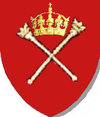
Interrex (Poland)
Encyclopedia

Polish-Lithuanian Commonwealth
The Polish–Lithuanian Commonwealth was a dualistic state of Poland and Lithuania ruled by a common monarch. It was the largest and one of the most populous countries of 16th- and 17th‑century Europe with some and a multi-ethnic population of 11 million at its peak in the early 17th century...
, whose ruling classes
Szlachta
The szlachta was a legally privileged noble class with origins in the Kingdom of Poland. It gained considerable institutional privileges during the 1333-1370 reign of Casimir the Great. In 1413, following a series of tentative personal unions between the Grand Duchy of Lithuania and the Kingdom of...
liked to view their Republic (Rzeczpospolita) or Commonwealth as an heir to Roman republic
Roman Republic
The Roman Republic was the period of the ancient Roman civilization where the government operated as a republic. It began with the overthrow of the Roman monarchy, traditionally dated around 508 BC, and its replacement by a government headed by two consuls, elected annually by the citizens and...
an traditions. The Commonwealth's monarch holding a double title of the Two Nations King of Poland and Grand Duke of Lithuania entered upon their office by free election (wolna elekcja), which often led to a relatively long interregnum
Interregnum
An interregnum is a period of discontinuity or "gap" in a government, organization, or social order...
. Since 1572, the role of interrex traditionally fell to the Archbishop of Gniezno and Primate of Poland
Archbishops of Gniezno and Primates of Poland
Archbishops of the Archdiocese of Gniezno and simultaneously Primates of Poland since 1418. They also served as interrex in the Polish-Lithuanian Commonwealth.*Since 1821 until 1946 in personal union with the Archdiocese of Poznań....
of the Roman Catholic Church
Roman Catholic Church
The Catholic Church, also known as the Roman Catholic Church, is the world's largest Christian church, with over a billion members. Led by the Pope, it defines its mission as spreading the gospel of Jesus Christ, administering the sacraments and exercising charity...
. The Archbishop could nominate a replacement (traditionally he would chose the bishop of Kujawy).
The interrex would represent the country on the international scene and oversee the internal administration until a new king was elected. In special circumstances he could declare war and negotiate peace. He summoned and presided over the convocation sejm and the election sejm, the gathering of nobility that elected the king. He also announced the election of the king.
| Interreges of the Commonwealth | ||
|---|---|---|
| Took the office of interrex in |
Gave up the office of interrex in |
Interrex |
| 1572 | 1573 | Jakub Uchański Jakub Uchanski Jakub Uchański , of Radwan Coat of Arms, was an archbishop of Gniezno and primate of Poland from 1562 to 1581, interrex from 1572 to 1573 and from 1574 to 1575.... |
| 1574 | 1575 | Jakub Uchański Jakub Uchanski Jakub Uchański , of Radwan Coat of Arms, was an archbishop of Gniezno and primate of Poland from 1562 to 1581, interrex from 1572 to 1573 and from 1574 to 1575.... (again) |
| 1586 | 1587 | Stanisław Karnkowski |
| 1632 | 1632 | Jan Wężyk Jan Wezyk Jan Wężyk , of Wąż Coat of Arms, was the bishop of Przemyśl and archbishop of Gniezno, , Primate of Poland and interrex after the death of king Sigismund III Vasa in 1632, before the royal election of Władysław IV Waza.As the interrerx he supported improving the procedures of the royal elections... |
| 1648 | 1648 | Maciej Łubieński |
| 1668 | 1669 | Mikołaj Prażmowski |
| 1673 | 1674 | Kazimierz Florian Czartoryski |
| 1674 | 1674 | illness and death of Kazimierz Florian Czartoryski led to him being replaced by the bishop of Kraków, Andrzej Trzebicki and bishop of Poznań, Stefan Wierzbowski |
| 1696 | 1697 | Michał Stefan Radziejowski |
| 1704 | 1705 | Michał Stefan Radziejowski (again) |
| 1704 | 1705 | Michał Stefan Radziejowski was stripped of his authority by the Pope and went into hiding. He was replaced by bishop of Poznań, Mikołaj Święcicki |
| 1733 | 1734 | Teodor Andrzej Potocki Teodor Andrzej Potocki Teodor Andrzej Potocki was a Polish nobleman , Primate of Poland, interrex in 1733.Teodor was Rector of Przemyśl and canon of Kraków since 1687, Bishop of Chełmno since 1699 and Bishop of Warmia since 1711... |
| 1763 | 1764 | Władysław Aleksander Łubieński |

